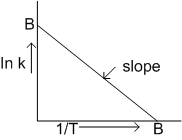For the chemical reaction,
2O3 ⇌ 3O2
The reaction proceeds as follows
O3 ⇌ O2 + O
O + O3 → 2O2 (slow)
The rate law expression will be
r = k' [O3]2
r = k' [O3]2[O2]-1
r = k'[O3][O2]
unpredictable
B.
r = k' [O3]2[O2]-1
As slowest step is the rate determining step. Hence, from slow reaction r = K[O][O3] ... (i)
From the fast reaction,






